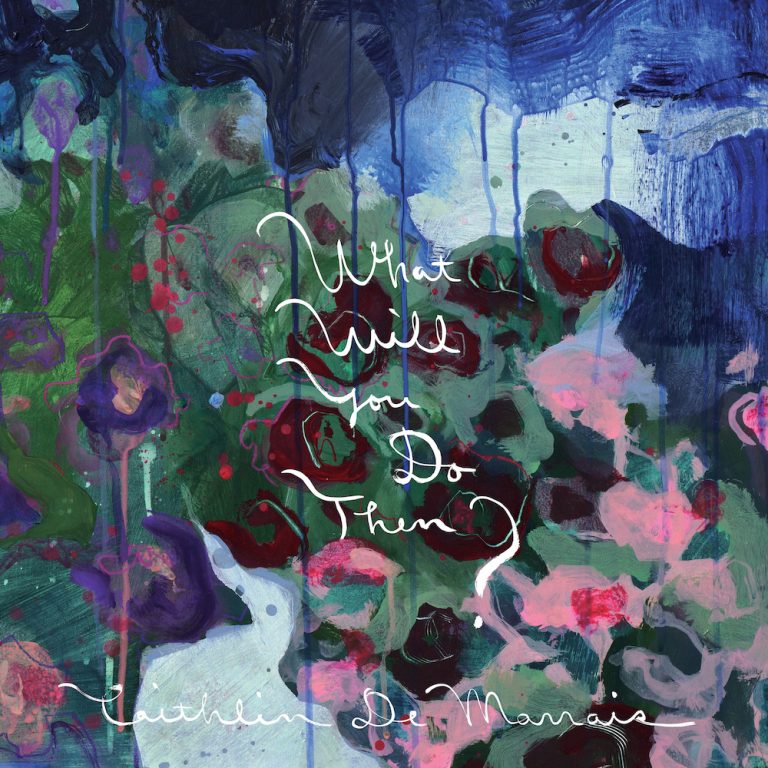Caithlin De Marrais’ dearly loved emo rock band Rainer Maria returned in 2017 after a long hiatus with a new album, S/T, which was loud, but polished and refined – a return to the driving sounds that made their name in the first leg of their career during the late 90s/early 2000s. In the 11 years between S/T and Rainer Maria’s preceding album, De Marrais quietly released two solo albums: 2008’s My Magic City and 2011’s Red Coats. With the sparse arrangements and acoustic instrumentation, the albums felt, at first, diametrically opposed to the gritty emo punk-inspired rock music she played with Rainer Maria. Yet they maintained her knack for infectious melodies, warmhearted vocal deliveries, and songwriting that, if amped up a bit, could have largely fit well into a latter-day Rainer Maria album.
Now, 10 years after Red Coats, comes de Marrais’ third solo album, What Will You Do Then?, and it feels like yet another pivot in a new direction. Last year, when she dropped the surprise “FiveFour” as part of Co-Mission: An Artist Relief Compilation, Vol. 1 (a benefit compilation organized by Folkadelphia), it was striking to see her move into quite different territory: the song consisted of little more than brittle, minimalistic, electronic sound design, chugging industrially under De Marrais’ well-worn and honeyed voice.
What Will You Do Then? seems to pick up where that track left off. On this album, De Marrais surrounds herself mostly with electronic instruments, programmed beats, synths that are sometimes serene and sometimes angular, and some minimal guitar accompaniment. It’s arguably the sparest sound palette she’s worked with yet, and the album has a distinctly homemade feel to it; made with simple tools, on a small scale, with only a select group of collaborators. But De Marrais does a lot with a little here, making small, sparkling worlds out of a relatively small set of ingredients.
Lead single “(Let Me Have A) Diamond Heart” relies mostly upon a one-note piano melody, fizzy beat, and double-tracked vocal, and it’s impressive that it ends up feeling like it’s not missing anything. De Marrais’ vocal does much of the heavy lifting here, conveying a melancholy woundedness without seeming to try to. This is true of much of the rest of the album, too: her direct, unaffected instrument is an easily-identifiable one. It’s not one of the most powerful or technically showy voices in indie music, but it’s always done exactly what it needs to do, with just a shade of some ineffable quality that pushes it into being more emotive and graceful. It can almost feel nonchalant at times, but that’s sort of its allure — think more Nina Nastasia or Julie Byrne, and less Neko Case or Beth Gibbons.
Other tracks pull a similar trick. “The Moon DGAF” has barely more than a cycling synth line, a steady pulse, and De Marrais’ disaffected voice, but it somehow wiggles its way into your brain, casting some kind of spell in its brief two minutes. “Once in a Lifetime (Love)” has a spooky, haunted house synth line and 80s electronic beat, and harmonies by filmmaker/actor Mark Duplass, shockingly blending in very well with the foreboding surroundings. The opener “Good Luck Come Back” has a sort of slow-motion, Pinback-esque guitar line over an echoing electronic clatter, and burbling synths. It’s an impressive example of minimalism being able to do more than its individual parts might suggest.
Other tracks do have more meat on their bones, and are mostly successful for it. The brief “Turnaround” finds De Marrais strutting and pleading, in one of the album’s more insistent vocal deliveries, over some Supernature-era Goldfrapp-lite electronics. It’s a bit of an outlier, and too brief to leave a huge impact, but it is an interesting, angular change of pace. “Secret Book Club” closes the album out with a lumbering beat, beautiful string-like synths, and a resigned lower-end vocal delivery. Best of all is “My Astrology”, which has a bit of a faster pace and sounder structure than many of the other tracks. A spidery guitar line grounds the intergalactic synths and looping drum pattern, as De Marrais sings, so prettily, lines like “You make me feel like you love me / When we’re fooling around / Must be the way you hold me.”
What Will You Do Then? is, at the end of the day, a relatively modest album. It’s small scale, pretty, personal, and at times a very exciting display of an established artist trying out some new tricks with some trusted friends. Caithlin De Marrais has been in the business for over 20 years, and to hear her still trying out new things, still making work at all, is a treat. Yes, the album could be more varied, some parts could be more fleshed out, and it does largely lack the bite of her main band’s best material (though it does maintain Rainer’s DIY, fuck-it attitude). But, taken as it is, it’s a lovely, catchy, smart, minimalist pop album – and sometimes that’s enough.

